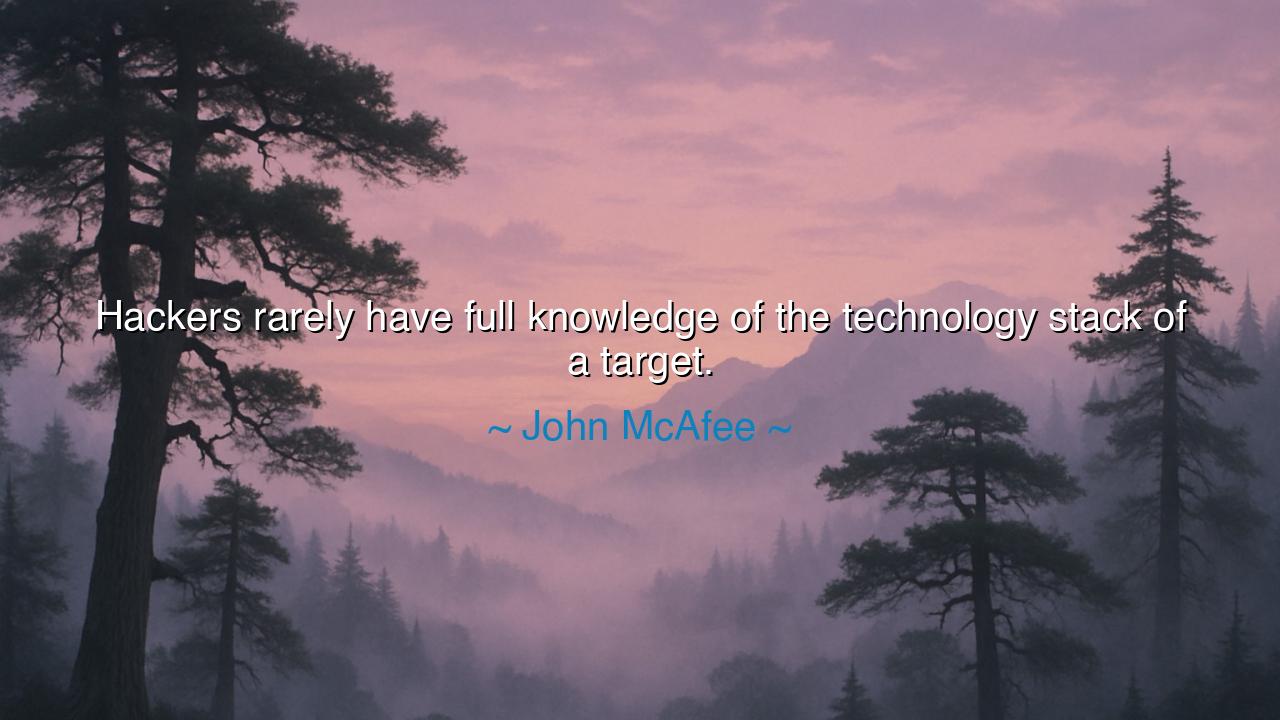
Hackers rarely have full knowledge of the technology stack of a






“Hackers rarely have full knowledge of the technology stack of a target.” Thus spoke John McAfee, the restless mind and pioneer of cybersecurity, whose life danced along the edge between chaos and enlightenment. In this statement, McAfee unveils not merely a truth of machines, but a truth of men — that even those who seek mastery over systems often see only fragments of the whole. His words echo across the corridors of modern civilization, where power flows through unseen circuits and invisible minds. The quote, born from the heart of the digital age, is both a warning and a reflection: that no one, not even the most cunning, ever fully grasps the infinite complexity of creation — whether made by man or by nature.
When McAfee declares that hackers rarely have full knowledge, he speaks not only of the cyber intruder probing systems of code, but of the universal condition of human limitation. The technology stack — that intricate layering of software, hardware, and network — mirrors the vast architecture of reality itself. Each layer conceals mysteries beneath it: the surface may be familiar, yet below it lie depths unfathomed. Just as the hacker guesses, infers, and manipulates without full vision, so too does every seeker of power act within the shadows of partial understanding. Knowledge, like light, is never complete — it illuminates, but also casts new shadows.
The world of cybersecurity, in McAfee’s time, had become a new battleground — invisible yet global. He had seen how the clever could breach the defenses of empires, corporations, and governments, yet even the most skilled were never omniscient. The hacker moves by instinct, by experiment, by courage and cunning, but not by perfect sight. For every exploit discovered, countless unknown defenses lie waiting. Thus, McAfee reminds us that power without understanding is always precarious. The digital warrior who acts without full knowledge risks unleashing chaos even upon himself. It is a parable not only for the hacker, but for every soul who seeks mastery without humility.
We find echoes of this wisdom in the ancient tale of Icarus, who, though gifted with wings of wax and feather, did not understand the forces that governed the sky. In his pride, he flew too close to the sun, and the same light that had inspired him melted the very wings that bore him. So too, the modern hacker or inventor who believes he commands the full system — whether of code or of life — may rise in brilliance, yet fall by the heat of his own ignorance. For McAfee, who himself lived boldly and dangerously, this truth was not theoretical. He understood that in every domain — technological, political, or personal — there is always a structure unseen, a stack of complexity beyond one’s reach.
And yet, McAfee’s words are not a counsel of despair, but of awareness. To recognize the limits of knowledge is the first step toward wisdom. The wise do not demand omniscience; they act with caution, curiosity, and reverence for what they do not yet understand. The hacker who humbles himself before the mystery of the system — who learns, observes, and adapts — will always surpass the reckless who acts on arrogance. Likewise, in life, those who admit what they do not know are the ones who grow; those who believe they know all are already blind. Thus, McAfee’s lesson extends beyond the network — it speaks to the architecture of the human mind.
Consider, then, how this truth applies to the age in which we live. We dwell in a world built on layers of invisible systems — economic, digital, biological, and social — each dependent upon the others. We are all, in some sense, hackers of life, seeking entry into the mysteries of success, love, and power. Yet like McAfee’s hacker, none of us have full knowledge of the stack. We know fragments, we guess at patterns, we act in partial light. Therefore, let us act not with pride, but with patience. Let us test, learn, and adapt, rather than assume mastery. In humility lies safety; in curiosity lies strength.
So, my children, take this as both warning and encouragement. Do not be deceived by the illusion of total control — for even the brightest among us see only part of the whole. Whether you deal in circuits or in souls, approach the unknown with respect, for every system — digital or divine — hides layers deeper than the eye can see. Build your wisdom one layer at a time, and never forget that beneath every visible surface lies an unseen foundation. In this way, you will walk the path not of the arrogant hacker who destroys, but of the true seeker who understands that knowledge, though incomplete, grows endlessly when joined with humility.
Thus, John McAfee’s saying endures as both parable and prophecy. It teaches us that mastery without understanding is peril, that intelligence without love is danger, and that every mind, however brilliant, remains but one node in the infinite network of truth. So learn — not to conquer the system, but to coexist with it. For though you may never know the full stack of knowledge, your heart, if humble and seeking, will always find the right path through its mysterious code.






AAdministratorAdministrator
Welcome, honored guests. Please leave a comment, we will respond soon